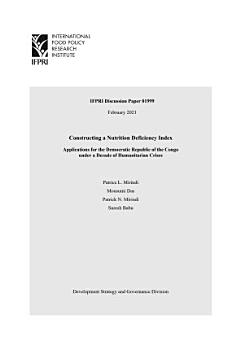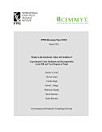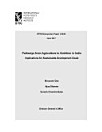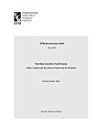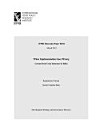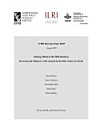Constructing a nutrition deficiency index: Applications for the Democratic Republic of the Congo under a decade of humanitarian crises
Mirindi, Patrice L. · Das, Mousumi · Mirindi, Patrick N. · Babu, Suresh Chandra
feb. 2021 · IFPRI Discussion Paper Bok 1 · Intl Food Policy Res Inst
E-bok
50
Sider
family_home
Kvalifisert
info
reportVurderinger og anmeldelser blir ikke kontrollert Finn ut mer
Om denne e-boken
The Democratic Republic of the Congo (DRC) is perennially plagued by prolonged phases of poverty, conflict, and increased internal migration, as well as pandemic outbreaks such as Ebola and COVID-19, and limited livelihood opportunities. Such unexpected or catastrophic events have rendered households vulnerable and resulted in poor health outcomes. Given this background, we intend to analyze the nutritional profile of households for a period spanning almost a decade using the Household Consumption Expenditure Survey (HCES). We construct a composite nutrition deficiency index (NDI), capturing intake of 14 different macro- and micronutrients (which we refer to as dimensions)—namely, calories, protein, calcium, zinc, folate, thiamine, niacin, iron, vitamin A, vitamin B12, vitamin D, vitamin B6, vitamin C, and vitamin E—using the popular Alkire-Foster methodology. This methodology, usually used to construct multidimensional poverty indexes, in this case helps measure the incidence, intensity, and combined extent of multinutrient deprivation. DRC’s values on the multidimensional NDI vary regionally from 0.13 to 0.73. Urban DRC performs worse than rural DRC. Regions subject to the conflict and Ebola crises are the worst-affected of the nutritionally deprived regions. Deficiency in calorie and protein intake contributes to the highest values of the NDI, but we also find evidence of a double burden of malnutrition, with households lacking consumption of both macro- and micronutrients. South Kivu is the worst-performing of all regions and Mongala the best. The northern parts of DRC have fewer nutritionally deprived households, as compared with the central and southwestern parts. Our main policy recommendation is to help improve market access in urban areas so that people consume a more diverse diet. In rural areas, the government should support improving nutrition-sensitive agricultural production. Although the World Food Programme has a sustained presence in the country, uplifting households from severe hunger, active participation by the government and collaboration with multiple stakeholders is called for.
Vurder denne e-boken
Fortell oss hva du mener.
Hvordan lese innhold
Smarttelefoner og nettbrett
Installer Google Play Bøker-appen for Android og iPad/iPhone. Den synkroniseres automatisk med kontoen din og lar deg lese både med og uten nett – uansett hvor du er.
Datamaskiner
Du kan lytte til lydbøker du har kjøpt på Google Play, i nettleseren på datamaskinen din.
Lesebrett og andre enheter
For å lese på lesebrett som Kobo eReader må du laste ned en fil og overføre den til enheten din. Følg den detaljerte veiledningen i brukerstøtten for å overføre filene til støttede lesebrett.
